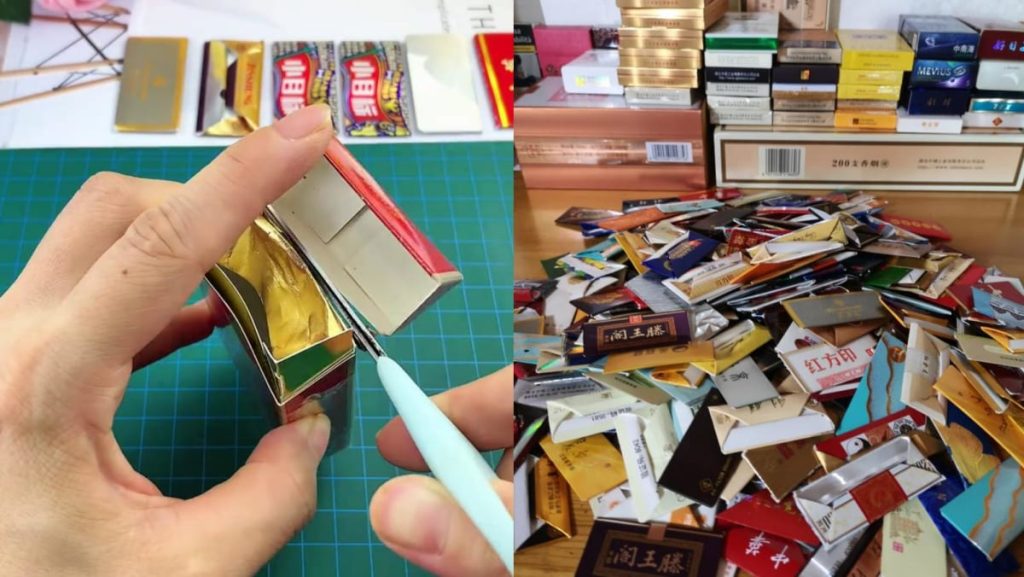The resurgence of cigarette card games among Chinese youth has sparked concern and controversy, leading to school bans and raising questions about the accessibility of tobacco-related materials to minors. These “yan ka,” or smoke cards, crafted from folded cigarette packs, have captivated students, transforming school hallways into trading grounds and classrooms into arenas of card-slapping competitions. The nostalgic appeal, coupled with a perceived “cool” factor associated with prestigious cigarette brands, has fueled this trend, echoing a similar craze that gripped China in the 1970s. The simplicity of the game, where players compete to flip their opponents’ cards using their own, adds to its allure, turning discarded packaging into coveted collectibles.
While the game itself appears harmless, the underlying issues are far more complex. The pursuit of these cards has driven some children to extreme measures, from scavenging through trash bins for discarded packs to engaging in criminal activities to obtain high-end cigarettes. The ease with which minors can acquire empty cigarette boxes from convenience stores and tobacco shops near schools, often for a nominal fee, highlights a significant loophole in regulations designed to prevent youth access to tobacco products. The problem extends beyond physical stores to online marketplaces, where ready-made cigarette cards are readily available without age restrictions, often marketed as toys or collectibles, further circumventing existing regulations.
The implications of this trend extend beyond classroom disruptions and petty disputes over card ownership. Educators and parents alike are concerned about the potential normalization of smoking and the unintended promotion of cigarette brands among young children. The association of specific brands with higher value within the game inadvertently elevates the status of these products in the eyes of children, potentially influencing future choices regarding tobacco consumption. The act of collecting and trading these cards also creates a constant visual and tactile connection to cigarette packaging, further embedding these brands in their minds.
This burgeoning trend underscores the challenges of regulating access to tobacco-related materials in the digital age. While China strictly prohibits the sale of tobacco and tobacco products to minors, the availability of empty cigarette packs and online card sales presents a significant challenge. Sellers often justify their actions by arguing that the cards are either printed material or do not contain actual cigarettes, exploiting legal loopholes to bypass regulations. This situation necessitates a re-evaluation of existing laws and enforcement mechanisms to address this evolving landscape and effectively protect minors from indirect exposure to tobacco promotion.
The documented cases of minors resorting to theft and other illegal activities to obtain cigarette cards are particularly alarming. The incident involving six youths in Sichuan, who were arrested for stealing high-end cigarettes worth over 60,000 yuan, highlights the potential for this seemingly innocuous game to escalate into serious criminal behavior. The fact that these teenagers discarded the actual cigarettes, littering forests and waterways, further demonstrates the disconnect between the pursuit of the cards and any genuine interest in smoking, emphasizing the allure of the game itself and the status associated with possessing valuable cards.
Addressing this issue requires a multi-pronged approach. Schools are implementing bans on bringing cigarette cards to class, aiming to curb the disruptions and peer pressure associated with trading. However, these measures alone are insufficient. Strengthening regulations surrounding the sale of empty cigarette packs, particularly in proximity to schools, is crucial. Online platforms must also take responsibility for monitoring and restricting the sale of cigarette cards, especially when marketed as toys or collectibles. Public awareness campaigns educating parents and children about the potential risks associated with this trend are also essential. By addressing the issue from various angles, authorities can effectively mitigate the negative impact of this resurgent craze and protect young people from the subtle influences of tobacco marketing.










